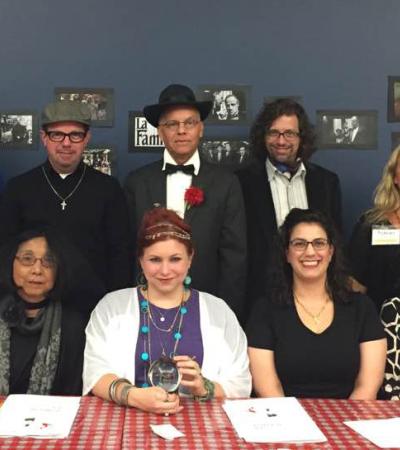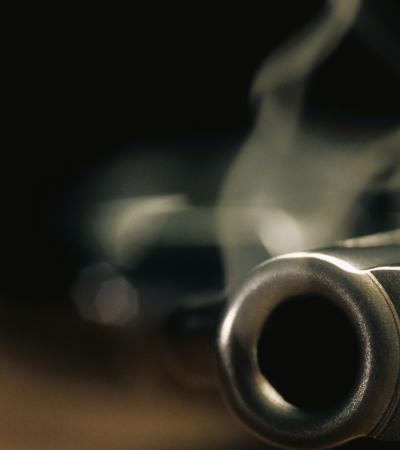Participants spent a Saturday examining true crime with professional investigators and educators, with a noted crime reporter and author as the featured speaker.
Sessions included "Notorious Crimes of the Cape Fear Region"; "The North Carolina Innocence Inquiry Commission"; "Today's P.I."; and a "Crash Course in Profiling."
Faculty from the local community college used a staged crime scene to explain forensic techniques used by law enforcement.
As a bonus, participants were invited to take a true-crime quiz and entered a drawing for a $25 gift card.
Advanced Planning
True crime is a perennially popular part of our adult nonfiction collection, and the popularity of TV shows and podcasts on the topic is growing. We decided to offer true-crime fans a daylong experience with real-life experts in the fields of detection, investigation and criminal justice.
A team of three librarians met in August 2018 to begin organizing. We contacted law enforcement and private investigators, forensic science instructors, a profiling expert and a representative from the NC Innocence Inquiry Commission. We asked them to give 45-minute presentations in their areas of expertise.
We decided to bookend the day with two featured speakers: a local historian who described some of the more notorious moments of our region's past, and a crime reporter from a local station who is also a true-crime author. Halfway through the planning process we added a true-crime quiz, with winners entered into a drawing for a $25 gift card.
We required registration, as this would give us a way to plan for adequate seating for the audience. Nearly 70 people signed up.
Marketing
The Crime Scene Library event got a full-page ad in our March calendar of events and was listed in the online calendar. (View the ad under Attachments.)
Our marketing department featured it on the library's Facebook page, tweeted about it and included it in the slideshow of upcoming events on the library's website. One of the team members also wrote a column that ran in the local paper a few days before the event.
The Headquarters Library featured a display of true-crime titles in its main display space for two weeks leading up to the event.
We did not want to take anyone by surprise, so we included a notice in all our publicity: "Portions of some presentations may be too graphic for younger or more sensitive participants."
Budgeting
We spent $25 for a gift card (provided by our Friends group) for the winner of the true-crime quiz.
Our marketing department put together swag bags for the presenters, made up of leftover adult summer reading program prizes and some promotional items like pens and writing pads.
We used back stocks of water and sodas from previous programs to offer presenters and attendees, so there was no additional cost for these items.
Day-of-event Activity
The day before the event our custodial staff set up the two presentation spaces with seating for 70 (main space) and 40 (secondary space). We ensured that each space had a laptop, projector and projection screen.
We ran 100 copies of the day's schedule and the true-crime quiz, and pre-staged them near the main presentation space. (See the Crime Scene Library schedule of events and True Crime Quiz under Attachments.)
Two staff members called or emailed all those who had registered and reminded them about the program.
Program Execution
The day began at 10 a.m. in the main space, with a brief welcome and some housekeeping announcements. The first speaker was our local historian. After that we ran concurrent sessions featuring six speakers — two per hour — with an hour off for lunch.
Throughout the day, in a smaller meeting space, faculty from the community college's forensic science program staged a crime scene, complete with a "dead body" slouched in a corner. People came in and learned about forensic science techniques/procedures. There was a hands-on element to this part of the day, which proved very popular.
The final session featured our television reporter/author. Afterwards, we drew a name for the winner of the quiz. The program concluded at 4 p.m.
Fifty-five people attended the programs. To collect feedback we used the library's regular programming comment cards. There was also space on the quiz sheets for additional comments, and participants verbally expressed their satisfaction to library staff. Comments were almost unanimously positive:
- "Excellent and thorough presentations."
- "Very impressed with the highly professional caliber of the speakers. Crime scene room was a blast!"
- "Marvelous. Very interesting. Great presenters."
- "Thanks for offering this to the public. I have learned so much about how the criminal justice system works, cold case, fingerprints, legal system."
This tells us that we reached our goal of giving true-crime fans an event they could enjoy.
It is too early to tell whether there has been an increase in circulation of true-crime materials in the collection. If nothing else, the event validates the large amount of items in the 364.1523s.
We built some great contacts for future programming, be it in individual programs or another Crime Scene Library program next year. Some of the presenters seemed a little surprised that people were fascinated by what they had to say and agreed to come back if invited. The forensic-science instructor was very happy to participate; for her, it was an opportunity to recruit students for her program. Several attendees expressed interest in exploring forensic science as a career.
Advice
Have a team of two or three enthusiastic, dependable people.
Draw up a checklist/timeline for all tasks with specific assignments for everyone.
Start early in finding presenters. Tap into law enforcement and faculty at community colleges and colleges/universities. Be clear on the length of their presentations.
Find out from presenters what their tech needs are. One of our speakers had information on a CD; we only had one computer with a CD drive, so we needed to ensure it was available for him.
Definitely include a hands-on or interactive portion. The staged crime scene was a huge hit!
If you can offer bottled water to attendees, do that. People were grateful that we had something for them to drink.
Include a notice or warning in all your publicity! A couple of our presenters showed some pretty gruesome photos of decomposing bodies/crime scenes. We wanted to be sure we had something to point to if anyone complained about that (so far, no complaints).
If we do this again, we'll start earlier and extend session times so presenters have more time and don't feel rushed. I'd also like to put up a LibGuide with reading lists and recommended television shows/podcasts.


